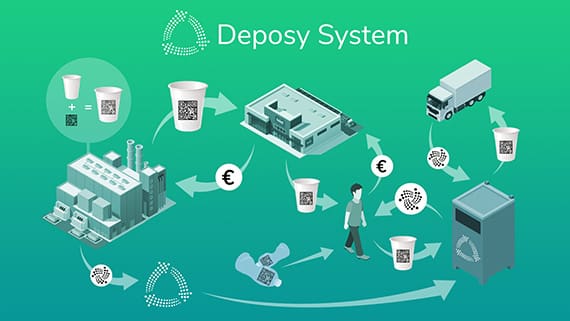Tackle Plastic Waste with IOTA
In September 2019 a German association was founded, which is called Biota e.V. (Association for Bio, Environmental and Climate Protection Tangle Applications) with the goal of reducing the flood of plastic waste worldwide. The amount of plastic waste on the planet is constantly increasing and, in addition to negative environmental influences, is now also affecting the health of many people. The current main project of the association runs under the name ‘Deposy’, which stands for ‘deposit system’. Deposy wants to preserve pure plastic waste through a specially developed deposit system as well as give people an incentive to collect and sort. In order to make the system attractive, more money is returned than was previously paid in deposit. According to the association, this could be achieved by potential government subsidies and donations, as well as from the value a sorted plastic waste possesses for further recycling process.
Since 1964 the production of plastic has increased twentyfold.
Currently, 400 million tons of plastic are produced annually worldwide and plastic production is expected to double in the next 20 years.
According to a study by management consultancy McKinsey, more than 30 percent of all plastic packaging does not enter an orderly recycling cycle, but is disposed elsewhere at the expense of nature. The experts estimate the resulting economic costs at 40 billion dollars per year. Micro-plastic particles produced during the decomposition of plastic waste are absorbed by humans and animals through nutrition and breathing air. According to experts, this entails increased health risks. On this occasion, a group of committed people joined together in a newly founded association to offer an opportunity to solve the problem.
The association believes that global plastic avoidance offers the greatest opportunity to restore the ecological balance. However, from a global perspective this is unfortunately an illusion, as scientists assume that plastic production will increase in the coming years. Looking at Europe, most plastic waste is either incinerated or shipped to Asia. A far too small percentage is actually recycled.
Since the beginning of 2019, the German legislator has introduced a stricter packaging law, which now also imposes certain recycling quotas on types of plastic. The current percentage is 58.5 % and by 2022 the quota that has to be taken back and recycled by the manufacturer will rise to 63 %. If the quota is not increased, there is a risk of heavy fines. This makes the recycling of plastics attractive to many companies. Previously, it was economically cheaper to produce new plastic and incinerate or ship old plastic. A global view shows that Germany is one of the few countries in the world to set such recycling quotas. Whether with or without quotas, the association would like to give the industry a greater incentive to recycle, because with the help of the new system the advantage of sorting according to type of plastic can be made possible.

That is exactly what makes the deposit system so attractive. The ‘Deposy’ project wants to address this issue and obtain pure plastic waste through a specially developed deposit system. In addition, the project should make it possible to give the population an incentive to collect and sort. The developed system is based on the fully suitable properties of IOTA, a distributed ledger technology. IOTA is a young crypto currency that enables a fast, secure and free transfer of data and finances. A conventional system, which would be handled by banks, would not meet the requirements of the system. The basic prerequisites for a successful implementation are scalability without exponentially increasing costs, transparency of the system and a decentralized, secure control of the processes. Micropayments could be carried out together with data exchange. Furthermore, this system can also be used away from the facilities otherwise required for deposit systems, e.g. shops. If one thinks on a global scale, then this characteristic can be enormously important. More detailed information can be found on the new website of the association www.deposy.org.
The deposit system based on IOTA offers the following advantages:
- The population gets a financial incentive for collecting, sorting and distributing plastic waste. More is paid back than has been paid as a deposit.
- The application is simple. It is based on IOTA, a modern distributed ledger technology and could be used worldwide.
- The collector gets the deposit either on his IOTA Wallet or thanks to a cooperation also in his local currency, e.g. Euro paid out to his account.
- The mechanical sorting of plastic waste is still complex today and also requires a lot of energy. Furthermore, a recycled plastic requires far less energy than a completely new production process. The deposit system thus helps to reduce CO2 emissions and achieve climate targets.
- This system makes it easier for the industry to achieve its recycling targets because it eliminates the upstream step of expensive mechanical sorting.
At present the Deposy deposit system exists as concrete concept, but in the opinion of the association a first test system could be submitted shortly. For the further procedure the group needs financial means, e.g. for the development of the return containers.